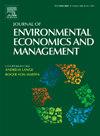Anticipatory effects of regulating the commons
IF 5.9
3区 经济学
Q1 BUSINESS
Journal of Environmental Economics and Management
Pub Date : 2025-05-24
DOI:10.1016/j.jeem.2025.103183
引用次数: 0
Abstract
We study the regulation of common-pool resources under long implementation horizons. First, we show that future regulation can induce either anticipatory compliance or perverse incentives to accelerate extraction (a “Green Paradox”). Then, we evaluate the early effects of a major groundwater regulation in California that does not yet bind. We assemble new data and compare within pairs of neighboring agencies that face varying restrictions on extraction. Differences in future regulation do not affect measures of water-intensive investments or groundwater extraction today. This lack of anticipatory response in either direction can be explained by time preferences: high private discount rates and/or a long implementation horizon dissipate any anticipatory effects. Common-pool resources face a lower risk of perverse incentives than excludable resources, but private actors still may not comply in advance.
管制公地的预期效应
我们研究了长期实施视野下的公共资源管理。首先,我们表明,未来的监管既可以诱导预期的合规,也可以诱导不正当的激励来加速开采(“绿色悖论”)。然后,我们评估了加州尚未生效的一项主要地下水法规的早期影响。我们收集新数据,并在面临不同提取限制的相邻机构之间进行配对比较。未来监管的差异不会影响今天对水密集型投资或地下水开采的衡量。在任何一个方向上缺乏预期反应都可以用时间偏好来解释:高私人贴现率和/或较长的执行期限消散了任何预期效应。与排他资源相比,公共资源面临的不当激励风险更低,但私人行为者仍可能不提前遵守。
本文章由计算机程序翻译,如有差异,请以英文原文为准。
求助全文
约1分钟内获得全文
求助全文
来源期刊
CiteScore
8.00
自引率
4.30%
发文量
91
期刊介绍:
The Journal of Environmental Economics and Management publishes theoretical and empirical papers devoted to specific natural resources and environmental issues. For consideration, papers should (1) contain a substantial element embodying the linkage between economic systems and environmental and natural resources systems or (2) be of substantial importance in understanding the management and/or social control of the economy in its relations with the natural environment. Although the general orientation of the journal is toward economics, interdisciplinary papers by researchers in other fields of interest to resource and environmental economists will be welcomed.

 求助内容:
求助内容: 应助结果提醒方式:
应助结果提醒方式:


